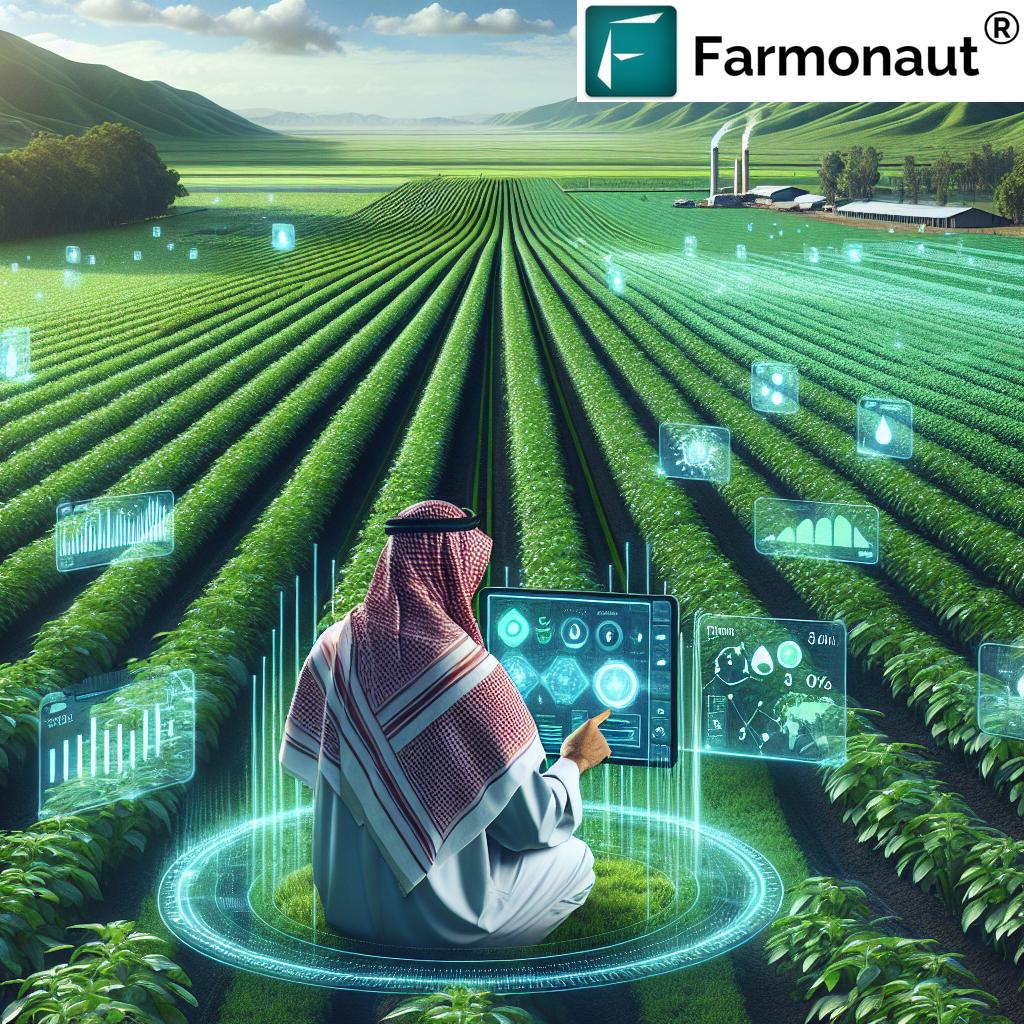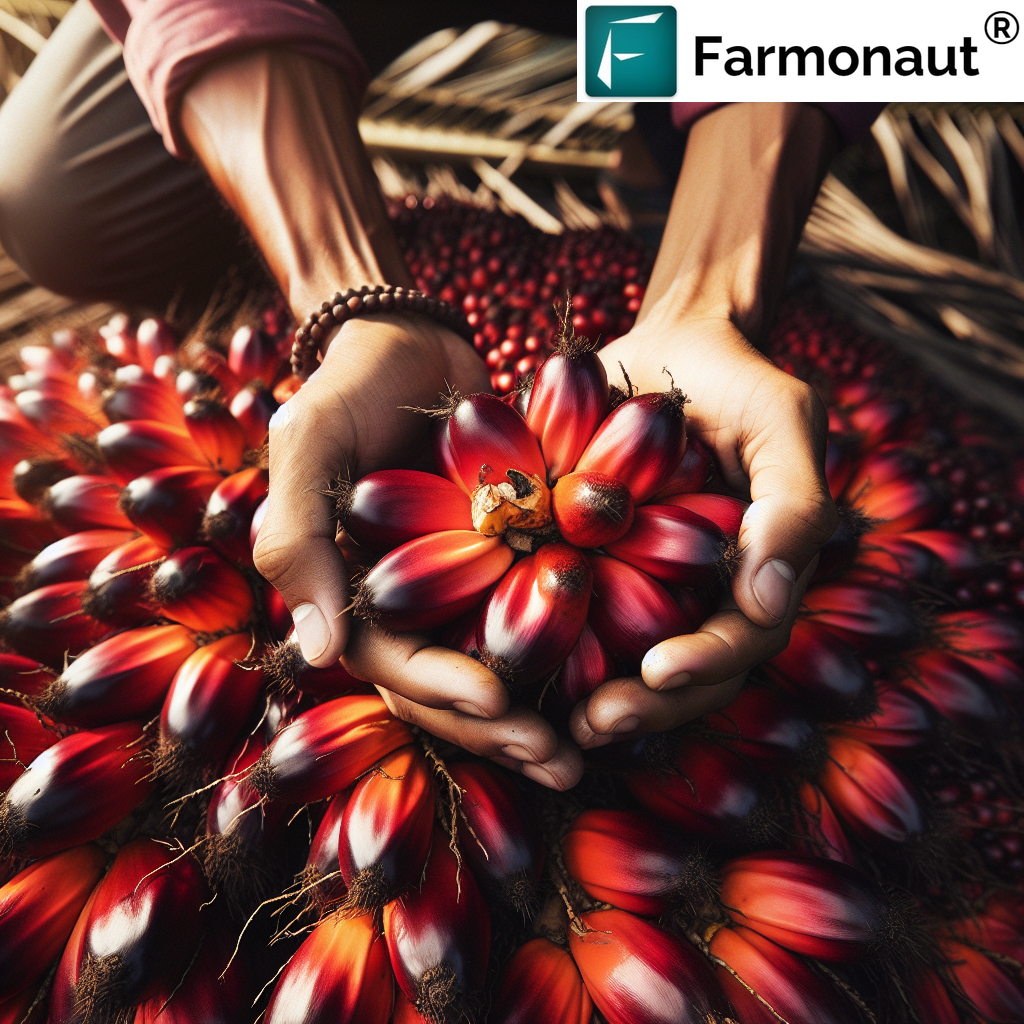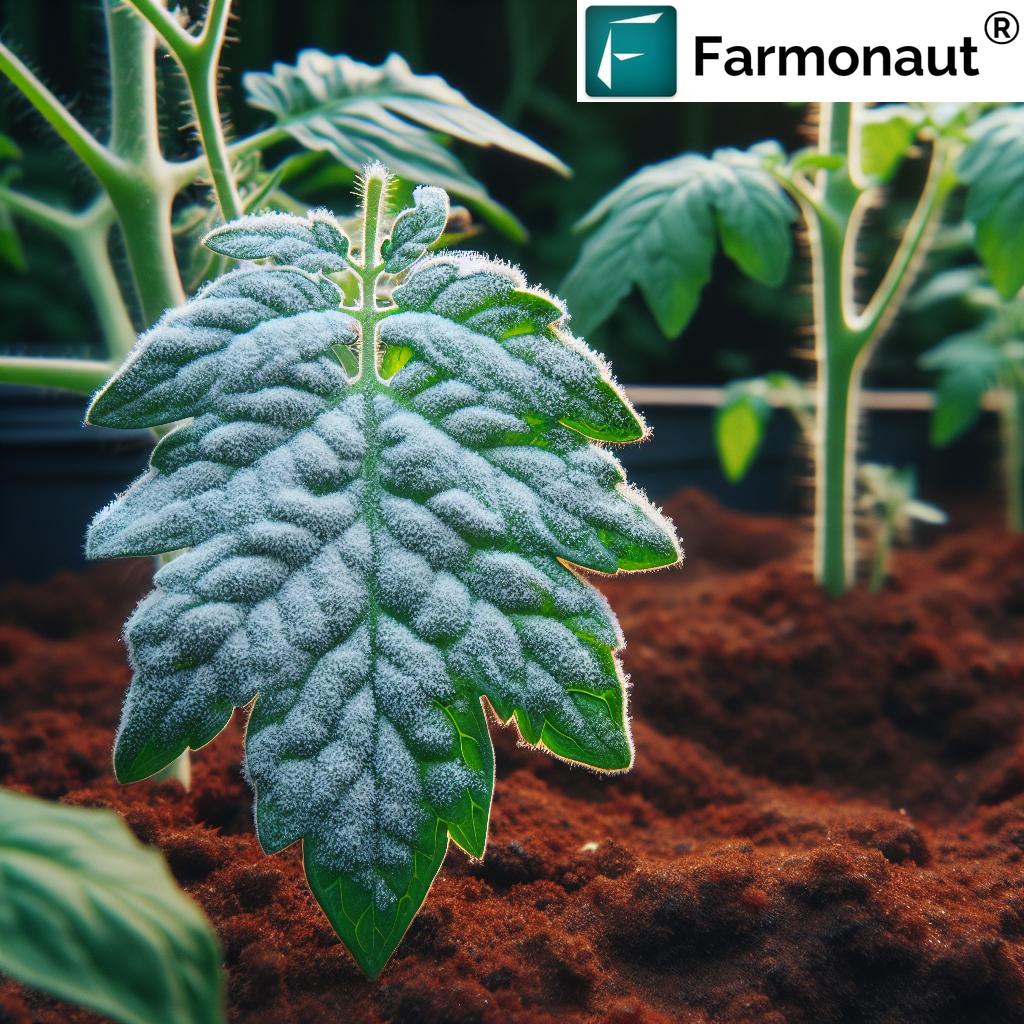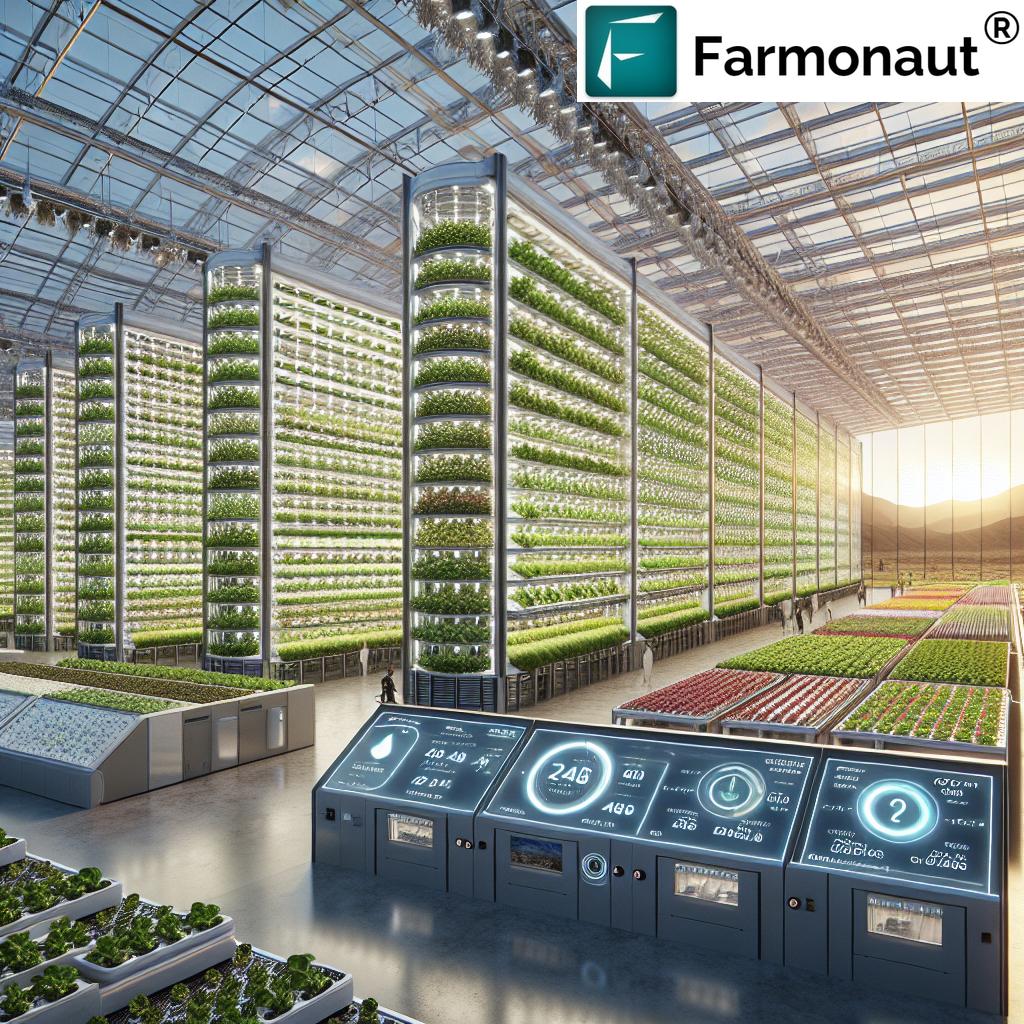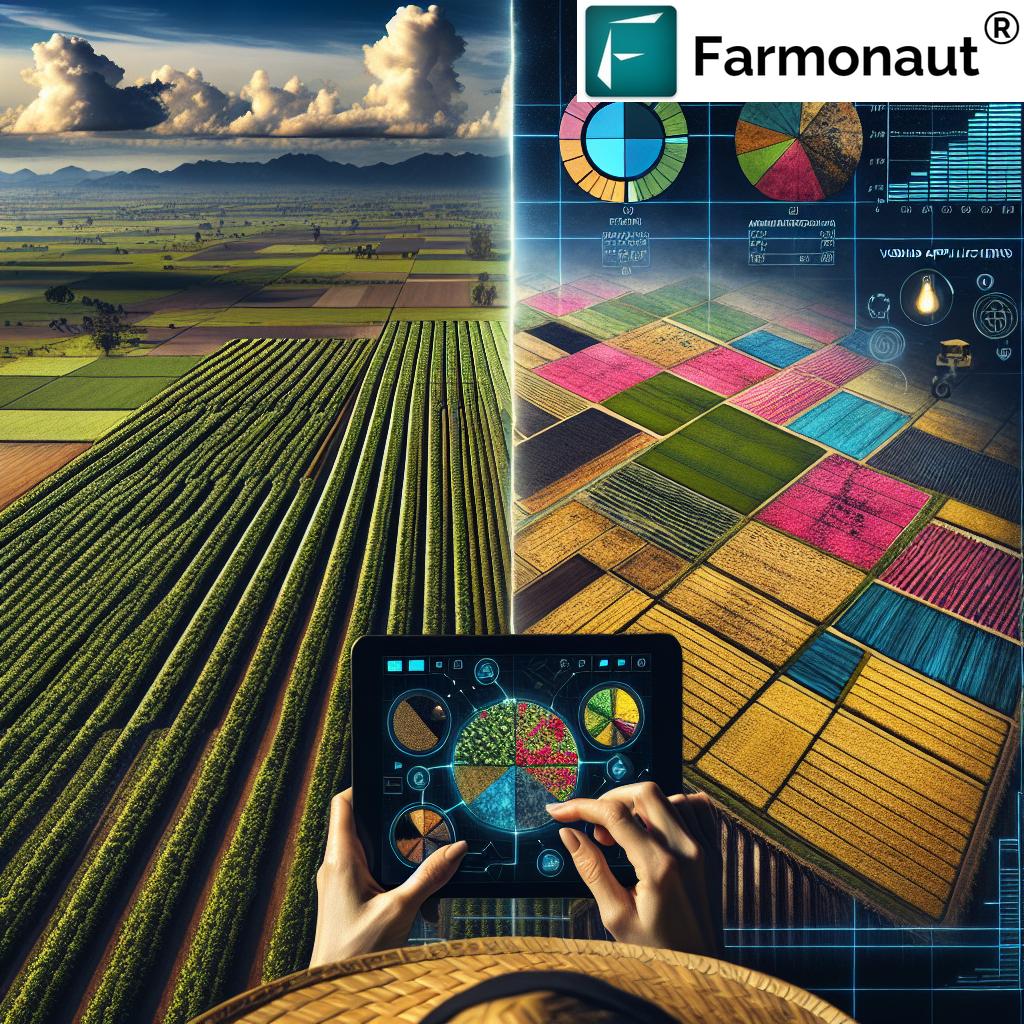Revolutionizing Agriculture: How AI and Big Data are Powering Smart Farming Solutions with Farmonaut
“AI-powered decision support systems in agriculture can process over 1 million data points per second for precision farming.”
In the ever-evolving landscape of agriculture, we find ourselves at the cusp of a technological revolution that promises to transform the way we grow, manage, and sustain our food systems. As we delve into the world of smart farming solutions, we’ll explore how artificial intelligence (AI) and big data are reshaping the agricultural sector, with a special focus on the innovative contributions of Farmonaut.
The Dawn of Smart Farming
Smart farming, also known as precision agriculture, represents a paradigm shift in how we approach cultivation and crop management. By harnessing the power of AI, machine learning, and big data analytics, we’re entering an era where farming decisions are increasingly data-driven, precise, and efficient.
- Enhanced crop monitoring and management
- Optimized resource allocation
- Improved yield predictions
- Real-time problem detection and resolution
These advancements are not just incremental improvements; they’re game-changers in our quest for sustainable agriculture and food security.
The Role of AI in Agriculture
Artificial intelligence is at the heart of the agricultural revolution. Machine learning algorithms, a subset of AI, are being employed to analyze vast amounts of data collected from various sources, including satellite imagery, IoT sensors, and historical records. This analysis leads to insights that were previously unattainable, enabling farmers to make informed decisions with unprecedented accuracy.
Key Applications of AI in Agriculture:
- Crop yield prediction
- Pest and disease detection
- Precision irrigation
- Automated machinery guidance
- Soil health analysis
One of the most exciting developments in this field is the emergence of AI-powered decision support systems. These systems integrate multiple data sources to provide farmers with actionable recommendations, taking into account factors such as weather patterns, soil conditions, and market trends.
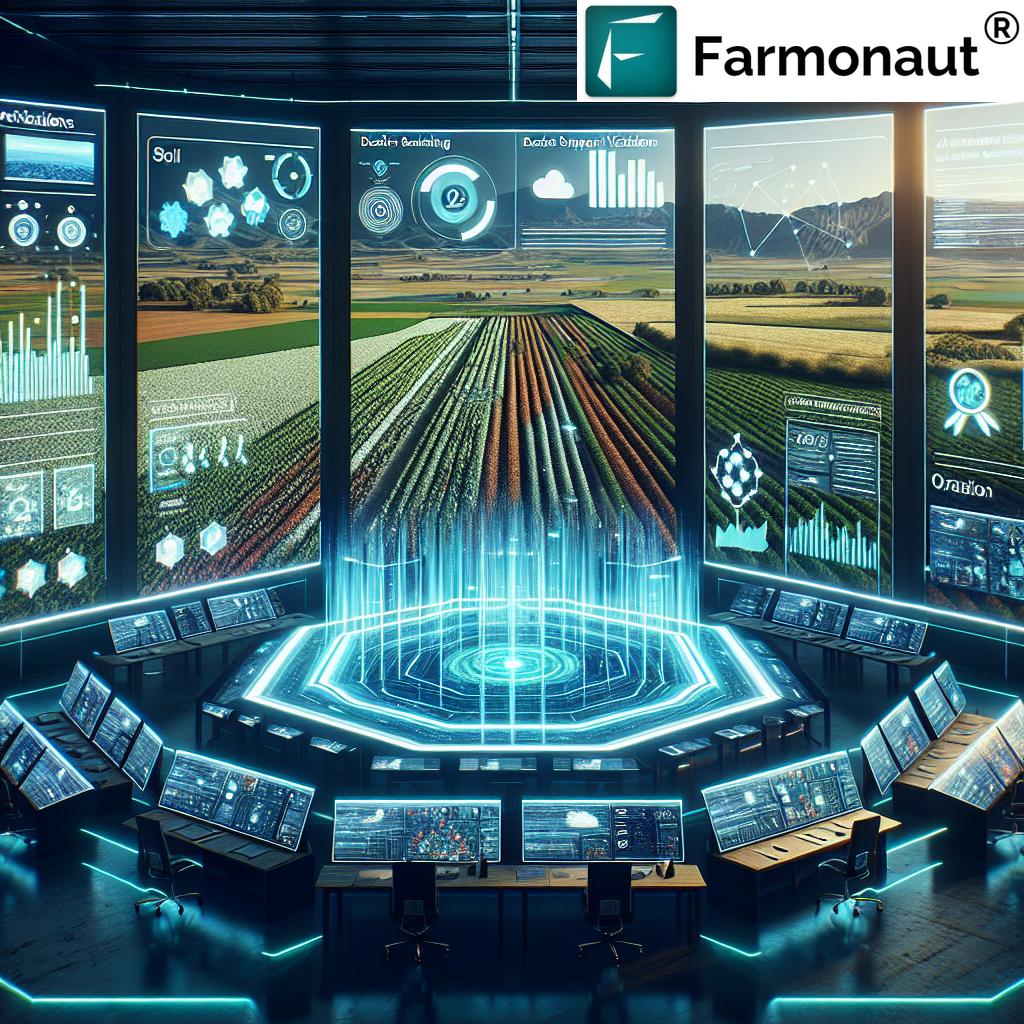
Big Data: The Fuel for Precision Farming
The agricultural sector is generating an unprecedented amount of data. From satellite imagery to soil sensors, weather stations to drones, the volume, velocity, and variety of agricultural data are expanding rapidly. This wealth of information forms the foundation of precision farming.
Sources of Agricultural Big Data:
- Satellite and drone imagery
- IoT devices and sensors
- Weather stations
- Farm management systems
- Market and economic data
By leveraging big data for precision farming, we can achieve:
- More accurate crop yield forecasts
- Optimized planting and harvesting schedules
- Efficient resource management
- Better risk assessment and management
The integration of big data analytics with AI algorithms creates a powerful toolset for modern farmers, enabling them to make data-driven decisions that boost productivity while minimizing environmental impact.
Farmonaut: Pioneering Smart Farming Solutions
At the forefront of this agricultural revolution stands Farmonaut, a company dedicated to making precision agriculture accessible and affordable for farmers worldwide. By leveraging advanced technologies, Farmonaut is empowering farmers with tools that were once the preserve of large agribusinesses.
Key Technologies Offered by Farmonaut:
- Satellite-based crop health monitoring
- AI-driven advisory systems
- Blockchain-based traceability solutions
- Resource management tools
These technologies form a comprehensive suite of smart farming solutions that address critical challenges in modern agriculture.
Explore Farmonaut’s solutions:
Satellite-Based Crop Health Monitoring
One of Farmonaut’s flagship offerings is its satellite-based crop health monitoring system. This technology utilizes multispectral satellite imagery to provide farmers with real-time insights into their crops’ health and development.
Benefits of Satellite-Based Monitoring:
- Early detection of crop stress
- Accurate assessment of vegetation health (NDVI)
- Monitoring of soil moisture levels
- Identification of areas requiring immediate attention
By providing this level of detailed information, Farmonaut enables farmers to make timely interventions, optimize resource allocation, and ultimately improve crop yields.
AI-Powered Decision Support: The Jeevn AI Advisory System
Farmonaut’s Jeevn AI Advisory System represents a significant leap forward in agricultural decision-making. This AI-driven tool analyzes a wide range of data inputs to provide personalized, actionable advice to farmers.
Features of Jeevn AI:
- Real-time crop insights
- Customized weather forecasts
- Expert-level crop management strategies
- Predictive analytics for yield optimization
By leveraging machine learning algorithms, Jeevn AI continuously improves its recommendations, adapting to local conditions and individual farm characteristics.
“Virtual extension systems using AI could potentially connect millions of farmers with experts, providing localized recommendations in real-time.”
Blockchain Technology in Agriculture
Farmonaut’s integration of blockchain technology into its platform addresses one of the most pressing issues in modern agriculture: traceability and transparency in the supply chain.
Applications of Blockchain in Farming:
- Secure and transparent record-keeping
- Enhanced food safety and quality assurance
- Improved supply chain efficiency
- Reduced fraud and errors in documentation
By implementing blockchain-based traceability solutions, Farmonaut is helping to build trust between producers and consumers, while also streamlining supply chain operations.
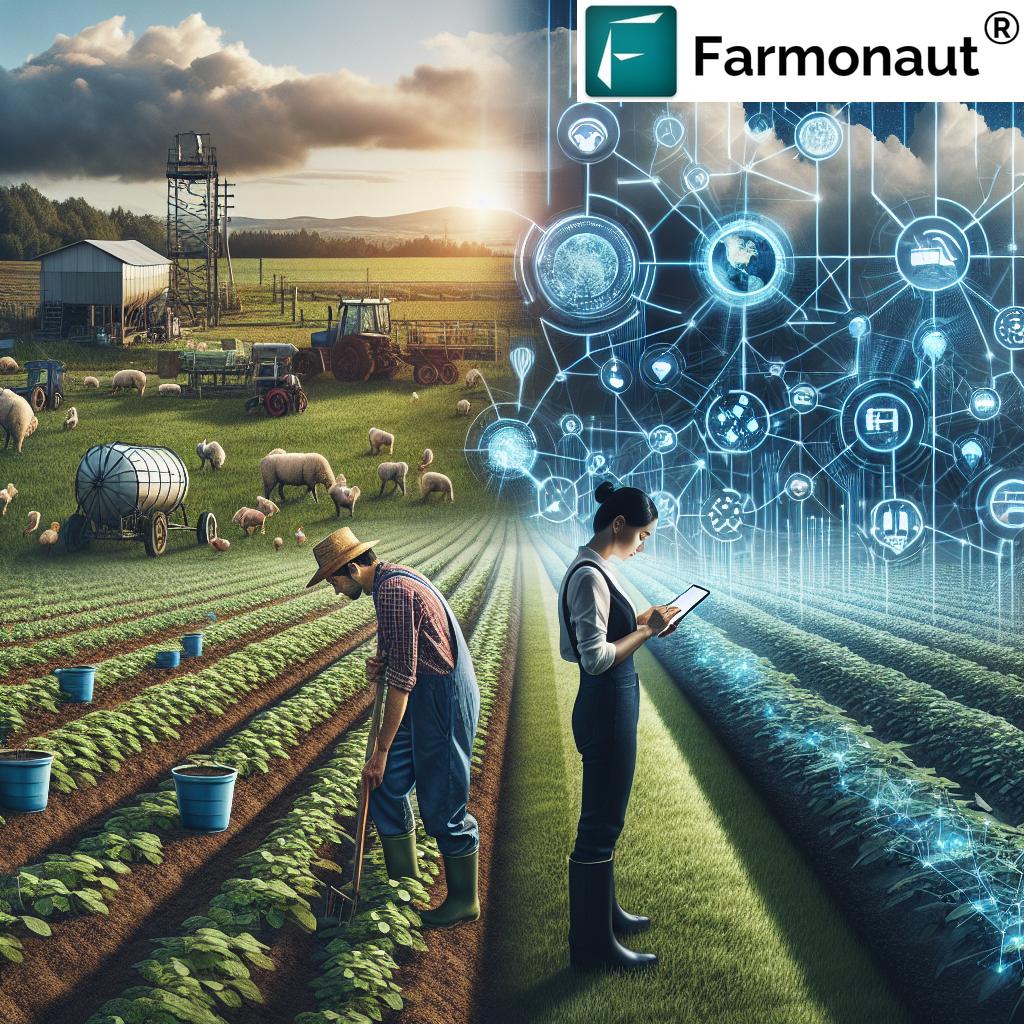
Resource Management and Sustainability
In an era where climate change and resource scarcity pose significant challenges to agriculture, Farmonaut’s resource management tools are more critical than ever. These tools help farmers optimize their use of water, fertilizers, and other inputs, leading to more sustainable farming practices.
Key Features of Farmonaut’s Resource Management Tools:
- Precision irrigation scheduling
- Optimized fertilizer application
- Fleet and machinery management
- Carbon footprint tracking
By providing real-time data on resource usage and environmental impact, Farmonaut empowers farmers to make decisions that are not only economically sound but also environmentally responsible.
The Power of Linked Data and Semantic Web in Agriculture
As we delve deeper into the realm of smart farming, the concepts of linked data and semantic web technologies are gaining prominence. These technologies have the potential to revolutionize how agricultural information is shared, accessed, and utilized.
Benefits of Linked Data in Agriculture:
- Improved data interoperability
- Enhanced knowledge discovery
- Facilitated data integration from diverse sources
- Support for more sophisticated AI and machine learning applications
By adopting semantic web technologies, we can create a more connected and intelligent agricultural ecosystem, where data from various sources can be seamlessly integrated and analyzed.
Virtual Extension Services: The Future of Agricultural Support
The concept of virtual extension services represents a significant evolution in how farmers access expert knowledge and support. Powered by AI and big data, these systems have the potential to provide personalized, localized advice to farmers around the globe.
Key Features of Virtual Extension Systems:
- 24/7 access to expert knowledge
- Personalized recommendations based on local conditions
- Real-time problem-solving support
- Continuous learning and improvement through data analysis
Farmonaut’s Jeevn AI Advisory System is a prime example of how virtual extension services are being implemented in practice, bringing expert-level advice to farmers’ fingertips.
Addressing Climate Change and Food Security
The twin challenges of climate change and food security are perhaps the most pressing issues facing agriculture today. Smart farming solutions, like those offered by Farmonaut, play a crucial role in addressing these challenges.
How AI and Big Data Contribute to Climate Resilience:
- Improved weather prediction and risk assessment
- Adaptive crop management strategies
- Efficient resource utilization to reduce environmental impact
- Development of climate-resilient crop varieties through data-driven breeding programs
By leveraging these technologies, we can create more resilient agricultural systems capable of withstanding the impacts of climate change while ensuring food security for a growing global population.
The Role of Cooperative Extension Technologies
Cooperative extension programs have long been a cornerstone of agricultural development. With the advent of AI and big data, these programs are evolving to become more effective and far-reaching.
Benefits of AI-Enhanced Cooperative Extension:
- Wider reach and accessibility of agricultural knowledge
- More targeted and personalized advice
- Rapid dissemination of new research findings and best practices
- Improved monitoring and evaluation of extension programs
By integrating AI and big data into cooperative extension programs, we can create a more dynamic and responsive system of agricultural support.
Challenges and Opportunities in Agricultural Data Management
While the potential of AI and big data in agriculture is immense, there are also significant challenges to overcome, particularly in the realm of data management.
Key Challenges:
- Data standardization and interoperability
- Data privacy and security concerns
- Ensuring data accessibility for small-scale farmers
- Bridging the digital divide in rural areas
Addressing these challenges will be crucial for realizing the full potential of smart farming solutions. Companies like Farmonaut are at the forefront of developing technologies and practices that make agricultural data more accessible, secure, and valuable for farmers of all scales.
The Future of Smart Farming
As we look to the future, the potential for AI and big data in agriculture seems boundless. From autonomous farming machinery to advanced predictive analytics, the next wave of innovations promises to further transform the agricultural landscape.
Emerging Trends in Smart Farming:
- Integration of 5G technology for enhanced connectivity
- Advanced computer vision for crop and livestock monitoring
- Precision gene editing for crop improvement
- AI-driven robotic systems for harvesting and processing
Farmonaut continues to be at the forefront of these developments, constantly innovating to bring the latest smart farming solutions to farmers worldwide.
Comparison Table: AI and Big Data Applications in Smart Farming
| Technology | Application | Benefits |
|---|---|---|
| Machine Learning Algorithms | Crop yield prediction, pest detection | Optimized resource allocation, improved decision-making |
| IoT Sensors | Real-time monitoring of soil and crop conditions | Precise irrigation and fertilization, early problem detection |
| Satellite Imagery Analysis | Large-scale crop health monitoring | Efficient farm management, reduced field scouting time |
| Predictive Analytics | Weather forecasting, market trend analysis | Improved risk management, better planning |
Conclusion
The integration of AI and big data into agriculture represents a transformative shift in how we approach farming. From precision crop management to sustainable resource utilization, these technologies are helping us address some of the most pressing challenges in agriculture.
Farmonaut stands at the forefront of this revolution, offering innovative solutions that make smart farming accessible to farmers of all scales. By leveraging satellite technology, AI, and blockchain, Farmonaut is empowering farmers to make data-driven decisions, improve productivity, and contribute to a more sustainable agricultural future.
As we continue to explore the possibilities of AI and big data in agriculture, one thing is clear: the future of farming is smart, sustainable, and data-driven. And with companies like Farmonaut leading the way, that future is closer than ever.
FAQ Section
Q: What is precision agriculture?
A: Precision agriculture is an approach to farm management that uses information technology and data analysis to optimize crop yields and reduce resource waste. It involves collecting and analyzing data from various sources to make more informed and precise farming decisions.
Q: How does AI contribute to smart farming?
A: AI contributes to smart farming by analyzing vast amounts of data to provide insights and recommendations. It can predict crop yields, detect pests and diseases, optimize irrigation, and assist in decision-making processes, among other applications.
Q: What are the benefits of using satellite imagery in agriculture?
A: Satellite imagery provides a comprehensive view of farmlands, allowing for the monitoring of crop health, soil moisture levels, and overall field conditions. It enables farmers to identify issues early, make informed decisions, and optimize resource allocation across large areas.
Q: How does blockchain technology improve agriculture?
A: Blockchain technology enhances transparency and traceability in the agricultural supply chain. It provides a secure and immutable record of transactions and product movements, which can improve food safety, reduce fraud, and increase consumer trust.
Q: What is the role of big data in precision farming?
A: Big data in precision farming involves collecting and analyzing large volumes of information from various sources such as sensors, satellites, and weather stations. This data is then used to make more accurate predictions and informed decisions about crop management, resource allocation, and farm operations.
Explore Farmonaut’s API: Satellite & Weather API
API Documentation: Developer Docs




